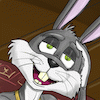
My first Zootopia sequel idea. Anti-rabbit agitators cause a stir in Zootopia with connections to a much less nice part of the world, run by bad rabbits.
Category Artwork (Traditional) / Doodle
Species Unspecified / Any
Size 801 x 1075px
File Size 331.5 kB
I do recall that. Loved that book. Mom read it to me as a bedtime story. But yeah, the local rabbit police were pretty consistently authoritarian all around.
And I imagine that if a traditionally prey animal were to evolve (or be uplifted) to be able to have human-like intelligence and the capability of tool usage, that they'd kind of overcompensate by becoming crazy aggressive.
And I imagine that if a traditionally prey animal were to evolve (or be uplifted) to be able to have human-like intelligence and the capability of tool usage, that they'd kind of overcompensate by becoming crazy aggressive.
Aggressive? Retaliatory or pre-emptive to start? Exclusionary or repressive thereafter? I'm looking for some unhappy stabilized situation in the rabbitland. Preds as controlled guest workers or some such, but life is less than rosey even for the rabbits with a rigid conform and comply society. Figure they are trying to undo Zootopia, especially the notion of species integration, as its success would challenge the rationalizations of segregation.
I play an anthropomorphic hare in a Pathfinder campaign (designed using the custom race building guide that they have available), a dashing swashbuckler type. I had him and his race originate from a fae realm, where they were uplifted from feral animals and given humanoid traits. I had them respond to this change by developing a strong martial culture, being very concerned with studying swordplay and being expert swordsmen, and having an innate alertness and paranoia. Not aggressive in the sense of being pre-emptive, but being very quick to stand up for themselves and their community. And they have a tendency to take offense easily and want to duel to the death at the drop of a hat...but those are pretty typical medieval values at play anyways.
And of course their preferred deity is a solar goddess.
And of course their preferred deity is a solar goddess.
My own take of the movie is that the "ooh, let's all get along" stuff was added in the rewrites. As was indicated by the early drafts, its basic theme is more Hobbesian (Hopps=Hobbes), with the proposed solution being a Plato-esque three-tiered society of Rulers, Enforcers and Producers. Everyone in their place, and happy knowing it. Democracy, as embodied in Bellwhether - literally one who leads a herd of sheep - is a chaotic sham.
Still an enjoyable movie, but when you strip away the nicey-nice song'n'dance ending, its "message" is pretty authoritarian and anti-democratic. Karl Popper would be turning in his grave.
Still an enjoyable movie, but when you strip away the nicey-nice song'n'dance ending, its "message" is pretty authoritarian and anti-democratic. Karl Popper would be turning in his grave.
I'm not quite getting how the film's message was "authoritarian". If anything, the film ends by admitting that life is imperfect and complicated, and the best thing we can do is to make it better by trying to understand other people. If you're saying it was an authoritarian film merely because the villain tries to abuse one of the flaws of a democratic system, then I don't quite see it. The early drafts of the film certainly seem more dystopian, but I think it's a stretch to say the film in its current incarnation supports an authoritarian reading.
This requires a long answer, so strap yourself in, man ...
(A lot of this is copied-and-pasted from my own journal entry on the film)
The clues are all in the names. Puns abound.
First off, "Zootopia" is a pun on Thomas More's "Utopia", a 16th century work of fiction and political philosophy, which was itself based on, and a critique of, the much older "Republic" of Plato.
Although "Utopia" is today understood to mean "an ideal place", this is a mistranslation: the literal meaning of More's original Greek was "no-place". In other words, More was saying, in contrast to Plato, that an ideal society was unattainable.
The next clue is in the names of the principal protagonists.
Judy Hopps is a pun on the 17th century English philosopher Thomas Hobbes. Exactly as Judy describes in her opening skit, Hobbes wrote that the "state of nature" was one of anarchic savage competition, a "war of all against all" in which the strong preyed on the weak, and there was no place for industry, culture, art or society: life was necessarily "nasty, brutish and short". In order to avoid this violent state of nature, people engage in a "social contract", in which individuals band together in a "common-wealth", pooling their resources for common security. This necessarily involves a tacit agreement from the strong to give up their natural advantage over the weak, and all members surrendering some degree of freedom to the sovereign (be it a literal sovereign or a sovereign state).
Judy's first name, by the way, comes from the Biblical character, Judith, a daring warrior woman who sets out on a lone mission to save her people from danger.
Nick is literally "Wilde", and represents the Hobbesian state of nature: he is solitary and selfish, waging a one-fox war against all. This is not because Nick is innately savage or evil but because, as Hobbes observed, in the state of nature, even when individuals are not actually fighting, they cannot be sure that others will not try and attack them - thus they live their lives in a constant state of mistrust and on guard against one another. Nick doesn't trust anyone else because he can't trust anyone else: he always has to assume that everyone else is out to get him.
"Zootopia" also references another 17th century work of political philosophy: Machiavelli's "The Prince". Machiavelli dedicated his book to Lorenzo de Medici, whose uncle was Pope Leo - thus it is no accident that it is Mayor Lionheart who makes the Machiavellian judgement to "do the wrong thing for the right reasons". The theme of Machiavelli's work was political realism: princes should do what is necessary - even if it betrays conventional morality - to hold the state together.
Deputy Mayor Bellwether's name is derived from a term for the leading sheep of a flock, which wears a bell on its neck (as she literally does in the movie), and in political parlance, means something that leads or indicates a trend. Bellwether thus represents contemporary poll-driven politics, or populism. Plato thoroughly disliked democracy because, he thought, it allowed the common people, who were stupid and sheep-like, to have too much power over the natural elites (like himself - Plato was descended from an aristocratic family) who should be in charge. This is a complaint we hear very often today.
Yet Mayor Lionheart's actions lead to disaster. So do Judy's. Nick's life is nasty, brutish and short. Bellwether is the most obvious villain of the piece.
So what does the film suggest as the ideal society?
The answer, it seems to me, lies in the work which Thomas More based "Utopia" on: Plato's "Republic".
Plato thought that the ideal society should consist of three classes: the Guardians or Rulers, the Auxilliaries or Warriors, and the Commoners or Producers. At the conclusion of "Zootopia", we see exactly that: Mayor Lionheart resumes his natural place as leader, Nick and Judy assume their role as Warriors enforcing his rule, and the hoi polloi (Judy's parents) contentedly take their place as Producers.
Although Plato's society was hierarchical, he also assumed that (a very few) people could, on merit, move between classes. Thus Judy, by virtue of her bravery and intelligence, is able to move from being a Producer to being a Warrior.
However, Plato also believed that most people were simply born to stay in their class. Rulers were born to rule. Producers were born to be common people and nothing else. Plato believed that people were happiest when they stayed were they were born to be: Judy's parents are happy being simple farmers. The very idea of social mobility is frightening to them.
This is where Plato's ideas - the "spell of Plato" as Karl Popper put it, in "The Open Society and its enemies" - have been so dangerously seductive. The idea that only a very special, selected few (naturally, "us") are born to lead, while the great common herd ("them", of course) are just born to do what they're told has been enormously appealing to would-be authoritarians for thousands of years. Plato has been the well-spring of nearly every authoritarian political creed, from Marxism to Fascism.
Which is why we should remember what Thomas More tried to tell us: "Utopia" is "no-place".
The perfect society doesn't exist.
(A lot of this is copied-and-pasted from my own journal entry on the film)
The clues are all in the names. Puns abound.
First off, "Zootopia" is a pun on Thomas More's "Utopia", a 16th century work of fiction and political philosophy, which was itself based on, and a critique of, the much older "Republic" of Plato.
Although "Utopia" is today understood to mean "an ideal place", this is a mistranslation: the literal meaning of More's original Greek was "no-place". In other words, More was saying, in contrast to Plato, that an ideal society was unattainable.
The next clue is in the names of the principal protagonists.
Judy Hopps is a pun on the 17th century English philosopher Thomas Hobbes. Exactly as Judy describes in her opening skit, Hobbes wrote that the "state of nature" was one of anarchic savage competition, a "war of all against all" in which the strong preyed on the weak, and there was no place for industry, culture, art or society: life was necessarily "nasty, brutish and short". In order to avoid this violent state of nature, people engage in a "social contract", in which individuals band together in a "common-wealth", pooling their resources for common security. This necessarily involves a tacit agreement from the strong to give up their natural advantage over the weak, and all members surrendering some degree of freedom to the sovereign (be it a literal sovereign or a sovereign state).
Judy's first name, by the way, comes from the Biblical character, Judith, a daring warrior woman who sets out on a lone mission to save her people from danger.
Nick is literally "Wilde", and represents the Hobbesian state of nature: he is solitary and selfish, waging a one-fox war against all. This is not because Nick is innately savage or evil but because, as Hobbes observed, in the state of nature, even when individuals are not actually fighting, they cannot be sure that others will not try and attack them - thus they live their lives in a constant state of mistrust and on guard against one another. Nick doesn't trust anyone else because he can't trust anyone else: he always has to assume that everyone else is out to get him.
"Zootopia" also references another 17th century work of political philosophy: Machiavelli's "The Prince". Machiavelli dedicated his book to Lorenzo de Medici, whose uncle was Pope Leo - thus it is no accident that it is Mayor Lionheart who makes the Machiavellian judgement to "do the wrong thing for the right reasons". The theme of Machiavelli's work was political realism: princes should do what is necessary - even if it betrays conventional morality - to hold the state together.
Deputy Mayor Bellwether's name is derived from a term for the leading sheep of a flock, which wears a bell on its neck (as she literally does in the movie), and in political parlance, means something that leads or indicates a trend. Bellwether thus represents contemporary poll-driven politics, or populism. Plato thoroughly disliked democracy because, he thought, it allowed the common people, who were stupid and sheep-like, to have too much power over the natural elites (like himself - Plato was descended from an aristocratic family) who should be in charge. This is a complaint we hear very often today.
Yet Mayor Lionheart's actions lead to disaster. So do Judy's. Nick's life is nasty, brutish and short. Bellwether is the most obvious villain of the piece.
So what does the film suggest as the ideal society?
The answer, it seems to me, lies in the work which Thomas More based "Utopia" on: Plato's "Republic".
Plato thought that the ideal society should consist of three classes: the Guardians or Rulers, the Auxilliaries or Warriors, and the Commoners or Producers. At the conclusion of "Zootopia", we see exactly that: Mayor Lionheart resumes his natural place as leader, Nick and Judy assume their role as Warriors enforcing his rule, and the hoi polloi (Judy's parents) contentedly take their place as Producers.
Although Plato's society was hierarchical, he also assumed that (a very few) people could, on merit, move between classes. Thus Judy, by virtue of her bravery and intelligence, is able to move from being a Producer to being a Warrior.
However, Plato also believed that most people were simply born to stay in their class. Rulers were born to rule. Producers were born to be common people and nothing else. Plato believed that people were happiest when they stayed were they were born to be: Judy's parents are happy being simple farmers. The very idea of social mobility is frightening to them.
This is where Plato's ideas - the "spell of Plato" as Karl Popper put it, in "The Open Society and its enemies" - have been so dangerously seductive. The idea that only a very special, selected few (naturally, "us") are born to lead, while the great common herd ("them", of course) are just born to do what they're told has been enormously appealing to would-be authoritarians for thousands of years. Plato has been the well-spring of nearly every authoritarian political creed, from Marxism to Fascism.
Which is why we should remember what Thomas More tried to tell us: "Utopia" is "no-place".
The perfect society doesn't exist.
Zootopia another fine example of the crapsack universe. All the evil and nasty bits just around the *corner* as it were. Shock collars, old school feral retreats, prey vs pred warring all nicely wrapped in a pretty bow. Not as bad as the really nasty bits of say Adventuretime (crapsack deluxe). Quite a intereresting movie and well backstopped universe making it a place you actually want to see more of rather then *yawn another perfect paradise*.
ILR would so move right in and agitate for rabbit rule and free shock collars with lifetime explosive charge thrown in for a bonus.
gaia bless
Pakesh_De
Snoofy uncollared old burr
ILR would so move right in and agitate for rabbit rule and free shock collars with lifetime explosive charge thrown in for a bonus.
gaia bless
Pakesh_De
Snoofy uncollared old burr

 FA+
FA+



















Comments